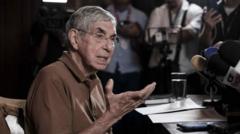Former Costa Rican President Oscar Arias, a distinguished Nobel Peace Prize winner, recently announced that his US visa has been revoked, a decision he believes is connected to his criticism of President Donald Trump. Speaking to journalists in San José, the 84-year-old Arias stated he received a brief email from the US government outlining the cancellation but providing no clear reasons behind it.
During his presidency from 2006 to 2010, Arias established diplomatic relations with China, a move that may have contributed to his recent visa woes as the Trump administration has shown a keen interest in curbing China's influence in Latin America. At the news conference, Arias expressed bewilderment at the absence of justification for the visa revocation, suggesting that the State Department, rather than Trump directly, was responsible for the decision.
Arias pointed out that the current Costa Rican President, Rodrigo Chaves, has fostered closer ties with the US by barring Chinese companies from participating in the country's 5G development—an action that has drawn criticism from both Arias and fellow politicians. Remarking on the broader implications of this US-Central America dynamic, Arias stated, “It has never been easy for a small country to disagree with the US government,” likening Trump's leadership to that of a “Roman emperor.”
This situation is not isolated, as other Costa Ricans, including three members of the national assembly who opposed the Chaves administration's stance on China, have also experienced visa cancellations. The growing restrictions are indicative of the complex and often contentious relationships Central American countries maintain with the US, especially amid shifting geopolitical alliances.



















